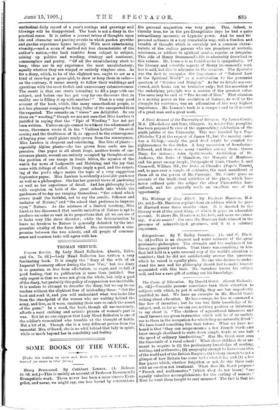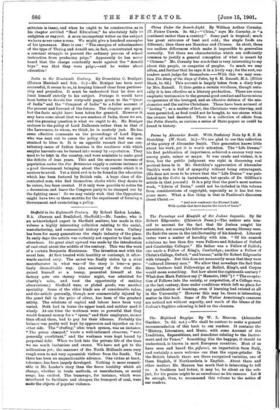The Curse of Education. By Harold Gent. (Grant Richards. 2s.
Gd.)—Versatile persons sometimes turn their attention to subjects with which, to put it mildly, they are but imperfectly qualified to deal. We have an example in Mr. Harold Gorst writing about education. Ile has courage, he has at command a fine flow of invective ; but he has but little knowledge of his; subject, and, as far as we can see, nothing positive or informing to say about it. "The children of agricultural labourers and smell farmers are given instruction which will be of no earthly use to them in the occupation for which they are naturally fitted." We have heard something like that before. What we have not heard is that "they can mispronounce a few French words and know enough shorthand to write down simple words at one half the speed of ordinary handwriting." Has Mr. Gorst over seen the time-table of a rural school? What these children do or are meant to acquire is (1) the preliminary knowledge of reading, writing, and arithmetic; (2) geography enough to have some idea of the world and of the British Empire ; (3) history enough to get a glimpse of how Britain has come to be what it is ; and (4) a few fine poems which, whether forgotten or not, do stir their souls with an emotion not irrational. What does Mr. Gorst propose ? " French and mathematics" [which they do not learn] "are equally valueless accomplishments for the carting of manure." Does he want them taught to cart manure? The fact is that his criticism is inane, and when he ought to be constructive, as in his chapter entitled "Real Education," he absolutely fails to enlighten or suggest. A more incompetent writer on the subject we have never come across. We might give a hundred examples of his ignorance. Here is one: "The energies of schoolmasters of the type of Thring and Arnold are, in fact, concentrated upon a constant struggle to prevent the ordinary process of school instruction from producing prigs." Apparently he has never heard that the charge constantly made against the " Arnold boys" was that they were prigs,—and be writes about education !











































 Previous page
Previous page